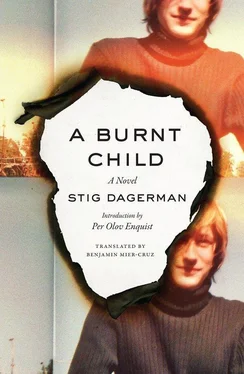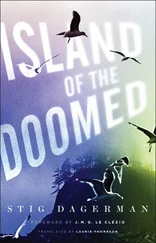Alma was pretty when she was young.
Yes, Alma was good-looking, all right.
Yes, when she was young, she was good-looking.
So you can understand why Knut, why Knut . . . um . . .
Then they remember the son, who is standing in the room and listening.
She had pretty hair, someone chimes in. Much too quickly. She was already expecting the girl by then.
Oh, she had a daughter?
Should’ve had, but she died.
As a baby?
She was just a year old. And then they had the boy, but they were married by then.
Then they remember him again, and this time they stay quiet. Someone pulls out a big white handkerchief and blows his nose. The radio is finally turned off. Then they step aside with squeaking steps because the coffee is coming. The nice aunt, whom he likes because she has been crying behind her glasses, is carrying the pot. She carries it high and dignified like a candlestick, and she is sweating through her tight, black dress. The younger aunt comes in behind her. She has black silk stockings, and the men in the room forget the occasion and admire her beautiful legs. She smiles at someone briefly. She has not been crying.
The father comes in last. Slowly and with a dejected gaze, he walks toward the son. Everyone has now turned around and stopped talking—even the one tapping the march has fallen silent. The father is silent, too. Silent and alone, they come together in the middle of the room. Their hands meet, and their arms meet. Then their chests meet. Finally, their eyes meet. Not long, yet long enough for both to see who has been crying and who is dry-eyed.
Don’t cry, my boy, the father says.
He says it quietly, but everyone still hears it. One of the guests lets out a sob, much too briefly, however. Shoes are squeaking and dresses are rustling like footsteps among leaves. The father’s arm is as hard as stone.
Don’t cry, my boy, he says once again.
Then the son gently frees himself from the man who has not cried. Alone, he walks all the way from his spot underneath the light to the table with the steaming cups and brimming glasses. Someone standing in the way bashfully steps aside. Without shaking, he picks up a cup, then a glass, and slowly turns around.
The father is still standing there, his stone arm hanging, as if wounded, on his right side. Slowly, he lowers his head and bends one of his red ears down. But it isn’t until the sun starts to beam through the windows that the son notices how unexpectedly bright the father’s eyes are. Then he spills a few drops of the dark, bitter wine on the floor between his shoes.
Before the cars arrive, they stand around in groups in different parts of the room. Four are standing under the chiming pendulum clock with glasses in their hands. They take sips when no one is looking. They are the widower’s relatives from the country, the ones you only see at weddings and funerals and whose clothes smell like mothballs. They look at the expensive clock. Then at each other. They look at the expensive encyclopedia with its leather binding glistening behind the glass of the bookcase. Then they glance at each other again and take another sip. At once, they are whispering with lips moistened by coffee and wine. They have never cared for the deceased.
Underneath the ceiling light, the sisters are standing with four of the father’s friends who took a Monday morning off to attend the funeral. Perhaps there could have been more, but not even the ones who came cared for the deceased. Nevertheless, they talk about her for a moment with subdued, muffled voices. Then they change the subject, but their voices remain the same.
The widower and the son are standing by one of the windows with three of the next-door neighbors: two women happy to experience a little variety and a man on sick leave. The son is standing closest to the window and has put down his glass and cup on the windowsill between two flowerpots. He knows that the neighbors disliked his mother, so he doesn’t care to listen. Still, the one who is sick talks about his illness. The two female neighbors talk about other illnesses. And the widower talks about the deceased’s illness. She had had a bad heart and had been bloated with water. In low voices, they talk about frail hearts and water.
Meanwhile, the son is looking out the window. He knows they will also be looking out the window soon, so he hurries to see as much as he can. He sees the blue tracks of the streetcar line, white with ice and salt along the bend. He sees freezing little snowflakes floating down to the street. He sees blue smoke rising from the chimney of a warm shelter. Some workmen, who had been tearing up the pavement with a drill and some picks, put their tools down, blow white smoke into their hands, and take a break. A cat is creeping through the snow, and directly across it a straddle-legged dray horse is peeing yellow and violently into the gutter.
The entire time, the sun is gleaming on a gilded bull’s head above a butcher shop. Everything is as usual in that shop. The door swings open and shut by people with vaporous breath. Meat is on display on white plates in the window, and the shop assistants raise their sharp cleavers behind the marble counter. Like so many times before, he leans against the window so closely that it fogs up from his hot breath. Like so many times before, yet not like those first few days—for it was worse in the beginning. In those days, the entire windowpane fogged up after only a moment, and he had had to grab his hand and pull it down to his pocket so that it wouldn’t break free and shatter the pane. He also had to bite his lips so that his mouth wouldn’t fly open and shout, Why haven’t you closed? You, down there! How could you! Why don’t you hang sheets over your windows? Why don’t you lock up your doors? Why are you letting your vans still deliver meat when you know what’s happened? You butchers! You ruthless butchers! Why are you letting everything go on as usual when you know that everything has changed?
He is calmer now and merely leans forward and watches. Merely leans forward and breathes. Merely shifts his gaze like a telescope toward the gilded bull’s head and the tall display window with its heaping mountains of meat. Merely presses his thighs painfully hard against the windowsill. Merely thinks, My mother died in there. My mother died in there while my father was sitting in the kitchen shaving and while I, her son, was sitting in my room playing poker with myself. In there, she fell off a chair without one of us there to catch her. It was in there that she lay on the floor amid the dirt and sawdust while a butcher stood with his back to her, cutting up a sheep.
Maybe he isn’t so calm, after all. Maybe he has said something, too. He might have even given a start. In any case, he feels a stone arm around his shoulder. In any case, he sees a stone hand rubbing and rubbing the misty glass. No, a large cold eye. He feels it with his fingertips and shivers. But the stone hand is still rubbing, and once it is finished, the eye is cold and clear, but the back of the hand is wet with tears. He wipes it off on his sleeve and then lets it fall.
Don’t cry, my boy, he hears the father whisper.
But he continues to cry. Someone presses a handkerchief into his hand, and as he is drying his eyes he can hear through the silence of the room that everyone is listening to him cry. Out of shame, he quiets down. Then he forces his eyes to comply and then rolls the little yellow handkerchief, which smells like pungent perfume, into a ball and proceeds to hand it to the nearest woman. That is when the father says:
Keep it. I have another.
The ball has grown heavy in his hand. He leans in closely against the glass, but it doesn’t fog up this time. The father gently presses his cheek against his. It is a cheek of stone.
Читать дальше












